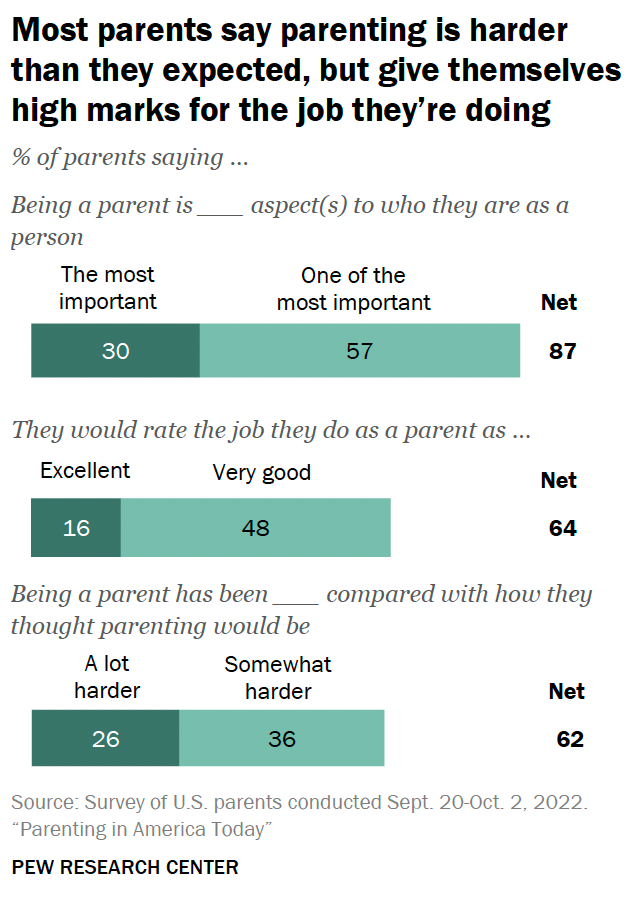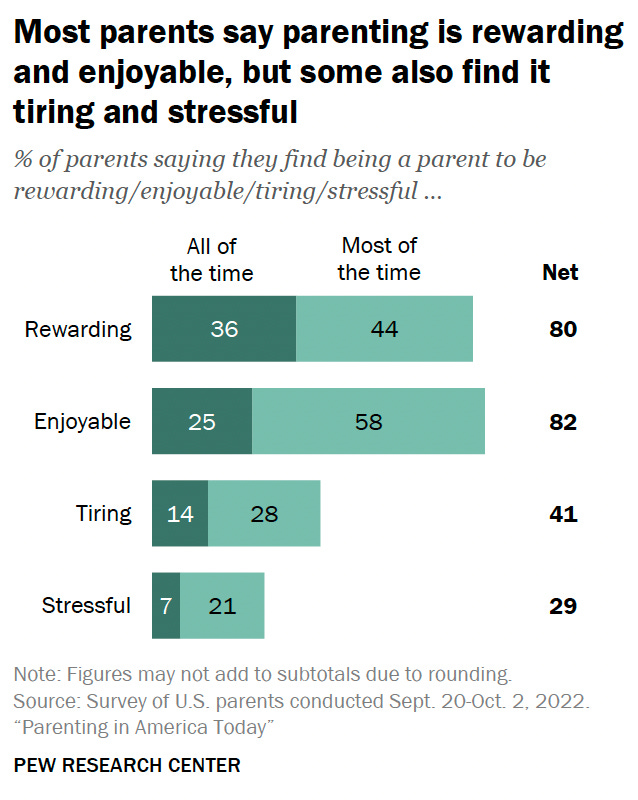What is Parenting Really Like Today?
A Pew Research Center survey on parents' current worries and desires for their children
Welcome to the Parenting Translator newsletter! Subscribe here for more research-backed tips for parents!
Source: Agung Pandit Wiguna/Pexels
Listen to the podcast version of the newsletter here:
The Pew Research Center recently published the results of a survey that they conducted to get a better understanding of how most parents are functioning right now in the United States. The Pew Research Center is a nonpartisan organization and think tank with the goal of generating data to support decision-making.
The Pew Research Center surveyed 3,757 parents of children 18 and younger from September to October 2022. The survey was weighted to be representative of the US population in terms of gender, race, ethnicity, political affiliation, and education.
Results of a survey like this can help us to understand how other parents experience parenthood and maybe even feel less alone in our own parenting journey.
How Hard Is Parenting?
Most parents indicate that parenting has been harder than they expected (62%) with over a quarter of parents (26%) saying it has been a lot harder than they expected and 36% saying it has been somewhat harder.
Yet, most parents feel pretty happy with how they are doing as a parent. Most parents (64%) say they are doing an excellent or very good job as a parent and 32% say they are doing a good job.
Parents also indicate that parenting is very important. 30% of parents say that being a parent is the most important part of who they are and 57% say it is one of the most important aspects of who they are.
Most parents (about 80%) report that parenting is rewarding and enjoyable all or most of the time, but many parents report that it is also stressful or tiring all or most of the time. This may also depend on the age of the children, since parents of children who are 5 and younger are more likely to report parenting is stressful and tiring most or all of the time. Mothers are also more likely than fathers to report that parenting is stressful and tiring.
Do You Want to Parent in the Same Way as Your Parents?
Interestingly, about as many parents indicate that they want to parent in a different way from their own parents (44%) as parents who indicate they want to parent in the same way as their parents (43%). Fathers are more likely than mothers to indicate that they want to raise their children in the same way that they were raised (47% vs 40%). In addition, more White parents (49%) indicate that they want to raise their children in the same way they were raised than Black parents (42%), Asian parents (37%), or Hispanic parents (32%).
So how exactly do parents want to parent differently?
Although most parents said they are raising their children in a similar way in terms values and religion, more parents indicated that they were parenting differently in terms of behavior/discipline (such as using more gentle discipline or avoiding spanking) and love/relationship (such as giving your child more affection or praise).
What Are Parents Most Worried About?
Parents report that their number one concern about their children is mental health (specifically struggling with anxiety or depression), with 40% of parents reporting they are very or extremely worried about their children’s mental health.
Other common concerns include being bullied, being kidnapped, or getting beaten up or attacked. Overall, these results suggest that parents are worried about both their children’s mental health and physical health, but that currently mental health seems to be the primary concern.
Mothers seem to be more worried than fathers. Lower-income parents seem to be more worried about physical health. Black and Hispanic parents are more likely to be worried about their children getting in trouble with the police or getting shot than White or Asian parents.
What Qualities Do Parents Think Are Most Important for Their Children To Have as Adults?
Most parents say that it is most important that they raise their children to be honest and ethical as adults, with nearly 94% reporting it is extremely or very important. Most parents also report that it is important that their children be hardworking, help others in need, and be accepting of people who are different from them. It is less important for parents that their children have similar religious and political beliefs.
What Do Parents Want for their Children in the Future?
Most parents (almost 9 out of 10 parents) say that they think it is extremely or very important that their children are financially independent and happy in their careers. Many parents (41%) also think it is very important that their children earn a college degree. A lower percentage of parents (about 20%) indicate that it is extremely or very important that their children get married and have their own children.
These results suggest that parents currently prioritize financial/career success over getting married and having children.
Overall Translation
Most parents report that parenting is both rewarding/enjoyable and stressful/tiring (it seems to be particularly stressful/tiring for parents of younger children and mothers). About 40% of parents say they want to parent in a different way than their own parents and about 40% say they want to parent in the same way. When they are parenting differently, it is usually related to discipline and affection, rather than values/religion. The primary concern of parents currently is their children’s mental health, even more so than physical safety. Most parents think the most important quality for their child to have as an adult is being honest and ethical and most parents tend to think that financial success in the future is more important than getting married and having a family.
Thanks for reading Parenting Translator! Subscribe for free to receive new posts and support my work.
Wondering how you can support Parenting Translator’s mission and/or express your gratitude for this service? It’s easy! All you have to do is share my newsletter with your friends and/or on your social media!
Thanks for reading the Parenting Translator newsletter! Subscribe for free to receive future newsletters and support my work.
Also please let me know any feedback you have or ideas for future newsletters!
Welcome to the Parenting Translator newsletter! I am Dr. Cara Goodwin, a licensed psychologist with a PhD in child psychology and mother to four children (currently a newborn, 3-year-old, 5-year-old, and 8-year-old). I specialize in taking all of the research that is out there related to parenting and child development and turning it into information that is accurate, relevant, and useful for parents! I recently turned these efforts into a non-profit organization since I believe that all parents deserve access to unbiased and free information. This means that I am only here to help YOU as a parent so please send along any feedback, topic suggestions, or questions that you have! You can also find me on Instagram @parentingtranslator, on TikTok @parentingtranslator, and my website (www.parentingtranslator.com).
DISCLAIMER: The information posted by Dr. Cara D. Goodwin, PhD, Parenting Translator, and its representatives on the Instagram account @parentingtranslator, TikTok account @parentingtranslator, website (ParentingTranslator.com), and newsletter (parentingtranslator.substack.com), or any other medium or social media platform (the “Information”) is for educational purposes only and is not intended or implied to be a substitute for professional medical, mental health, legal, or other advice. Parenting Translator is not engaged in rendering diagnosis, treatment, counseling, or therapy services by providing the Information, and your use of the Information does not create any practitioner-patient or other treatment relationship between you and Dr. Cara D. Goodwin, PhD, Parenting Translator, or any of its representatives. Dr. Cara D. Goodwin, PhD, Parenting Translator, and its representatives assume no responsibility and expressly disclaim liability for any consequence relating directly or indirectly to any action or inaction you take based on the Information. Reliance on any Information provided by Parenting Translator, its representatives, and contributors, is solely at your own risk. Always seek the advice of your own licensed and qualified medical, mental health, legal, or other professional, and do not disregard professional advice or delay in seeking it based on the Information. Call your medical or mental health professional, or 911, for all emergencies.












I really enjoyed reading this. I will say that none of the findings surprised me except for the anxiety/depression piece. I sort of wonder how it shakes out when looking at racial/ethnicity segments (which you mentioned) and how things rank for those segments. I also wonder if the majority are projecting their own depression/anxiety and hoping the same doesn’t happen to their kids? It would be cool to unpack that as well.
Thank you for such an interesting read! It doesn’t surprise me at all which I guess is a good thing because it means there are lots of others feeling how I feel about parenting 😅
So many interesting pieces of data here. I am especially reflecting on the mixed data on wanting to parent like your parents. I want to go back and compare this to the results 5, 10 and 15 years ago.